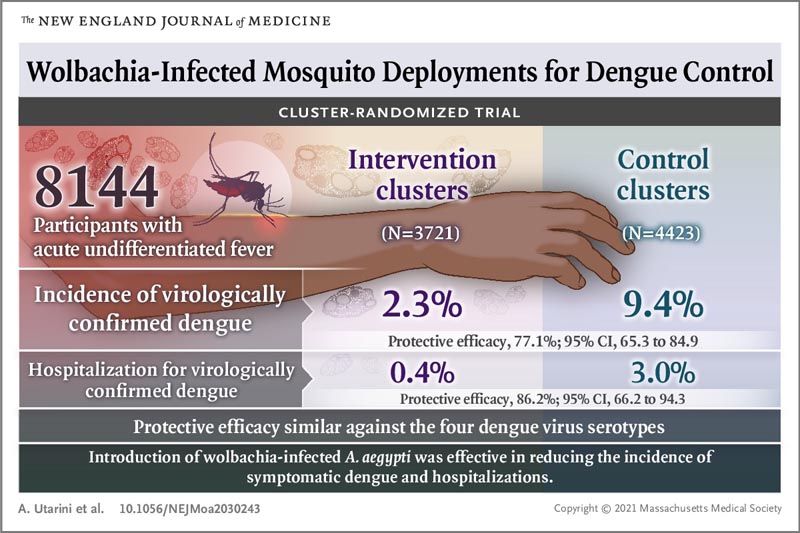Dengue is an acute mosquito-borne viral syndrome caused by any of the four serotypes of the dengue virus (DENV). In 2019, the World Health Organization designated dengue as one of the top 10 threats to global health.
Every year, 100 million symptomatic cases occur worldwide. Dengue epidemics occur annually or at intervals of several years, and the increase in the number of cases puts considerable pressure on health services.
Aedes aegypti mosquitoes are the main vectors of dengue. Efforts to control A. aegypti populations with the use of insecticides or environmental management methods have not been effective in controlling dengue as a public health problem in most countries.
Few randomized trials of A. aegypti control methods have been conducted, and none have. used the endpoint of virologically confirmed dengue (VCD). A community mobilization trial to reduce the A. aegypti population in Nicaragua and Mexico showed modest efficacy (29.5%) against dengue seroconversion in residents’ saliva.
Wolbachia pipientis, a type of common, maternally inherited, obligate intracellular bacteria, infects many insect species, but does not occur naturally in A. aegypti. Stable transinfection of A. aegypti with some wolbachia strains confers resistance to disseminated infection by DENV and other arboviruses. Therefore, introgression of “virus-blocking” wolbachia strains into field populations of A. aegypti is an emerging method of dengue control.
Wolbachia facilitates its own population introgression by manipulating reproductive outcomes between wild-type and wolbachia-infected mosquitoes: the only viable mating outcomes are those in which the progeny are infected with wolbachia.
Here, we present the results of a cluster-randomized trial that evaluated the effectiveness of deployments of A. aegypti mosquitoes infected with the wMel strain of wolbachia in reducing the incidence of VCD in Yogyakarta, Indonesia. The trial is based on previous entomological and epidemiological pilot studies in this geographical setting.

Background
Aedes aegypti mosquitoes infected with the wMel strain of Wolbachia pipientis are less susceptible than wild-type A. aegypti to dengue virus infection.
Methods
We conducted a cluster randomized trial involving the release of wMel-infected A. aegypti mosquitoes for dengue control in Yogyakarta, Indonesia. We randomly assigned 12 geographic clusters to receive deployments of wMel-infected A. aegypti (intervention clusters) and 12 clusters to receive no deployments (control clusters). All clusters practiced local mosquito control measures as usual.
A test-negative design was used to evaluate the effectiveness of the intervention. Patients with acute undifferentiated fever who presented to local primary care clinics and were between 3 and 45 years of age were recruited.
Laboratory testing was used to identify participants who had virologically confirmed dengue (VCD) and those who were test-negative controls.
The primary endpoint was symptomatic VCD of any severity caused by any dengue virus serotype.
Results
After successful introduction of wMel into the intervention groups, 8144 participants were enrolled; 3721 lived in intervention groups and 4423 lived in control groups.
In the intention-to-treat analysis, VCD occurred in 67 of 2905 participants (2.3%) in the intervention groups and in 318 of 3401 (9.4%) in the control groups (aggregated odds ratio for VCD, 0.23; 95% confidence interval [CI], 0.15 to 0.35; P = 0.004).
The protective efficacy of the intervention was 77.1% (95% CI, 65.3 to 84.9) and was similar against all four dengue virus serotypes.
The incidence of hospitalization for VCD was lower among participants living in intervention groups (13 of 2905 participants [0.4%]) than among those living in control groups (102 of 3401 [3.0%]) ( protective efficacy, 86.2%; 95% CI, 66.2 to 94.3).
Conclusions Introgression of wMel into A. aegypti populations was effective in reducing the incidence of symptomatic dengue and resulted in fewer dengue hospitalizations among participants. |
(Funded by Tahija Foundation et al.; AWED ClinicalTrials.gov number, NCT03055585. Opens in new tab; Indonesia registration number, INA-A7OB6TW.)















